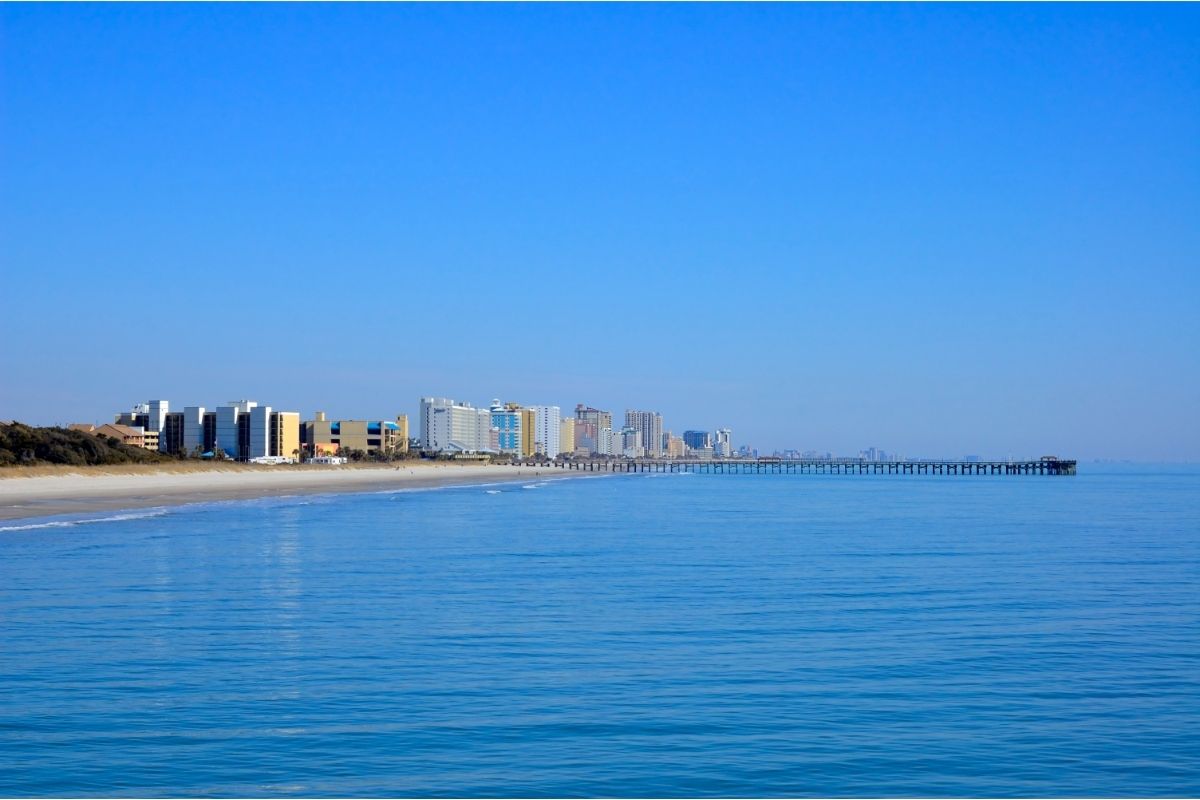Any fish fanatic will be able to tell you that fish can’t actually close their eyes or blink. If you own any fish, take a look and you’ll notice those big eyes will stare at you constantly since they don’t actually have eyelids.
Sharks are also fish, so it would be fairly logical to assume that they too cannot blink. However, you may be surprised to learn that the assumption is actually wrong.

Unlike other fish, a shark can close its eyes and blink. This is because sharks have something called a nictitating membrane which acts as a third eyelid.
But while sharks do have the ability to close their eyes, they won’t blink in the same way that you and I might.
This membrane can be found on the upper and lower part of the shark’s eyelids and they are really only their to protect their eyes. Also, not every shark has them either.
What Is The Purpose Of The Nictitating Membrane?
Simply put, the nictitating membrane’s job is to protect the shark’s eyes. It is a protective eyelid or layer between the eyes which protects the shark’s eye from injury.
When a shark attacks any potential prey, they will close their eyes so eliminate the chance of weakness.
This membrane isn’t the same as a human eyelid though, it is completely translucent so they still have full vision while their eyes are closed.
For many animals, and humans too, the purpose of an eyelid is also to preserve moisture in the eyes.
If you’ve ever had a staring contest you’ve probably witnessed first hand how dry and painful it can make your eyes to keep them open for a prolonged time.
This is why we tend to involuntarily blink. However, since sharks are already submerged in water they don’t need to moisturise their eyes.
This is why many other types of fish do not have eyelids of any kind.
These types of fish are not usually engaging in aggressive attacks and so don’t need the protection which is why you won’t find many other fish with the nictitating membrane.
So while sharks do have eyelids of some kind, it is quite obvious that they don’t need them for quite the same purpose.
Does Every Sharks Have A Nictitating Membrane?
Nope. There are species of sharks that do not have the membrane. Sharks are a very diverse animal with over 400 species of its kind.
At least 15 of these do not have a nictitating membrane. This doesn’t mean that they don’t have other forms of eye protection though.
For example a great white shark will roll its eyes to the back of its head when it is vulnerable. This will usually happen while they are attacking prey or mating.
As you can see though, 15 out of 400 is a small proportion and so it is fair to say that most sharks do have a nictitating membrane.
As a hunter a shark will really rely on their eyesight which is why they will go through such measures to ensure the eyes are protected, whether this is via blinking or rolling back the eyes.
Do Sharks Sleep With Their Eyes Closed?
It may not surprise you to find out that sharks and humans are very different. And well, they just don’t sleep like we do. As previously stated, they don’t really have eyelids as such, just a protective sheet over their eyes.
So they don’t really have any eyelids to close while they sleep. The nictitating membrane is usually only used when they are feeding or coming into impact with something so it doesn’t close when a shark goes to sleep.
So sorry to disappoint you if you were hoping to find a sleeping shark, but their eyes will still be open. They generally just shut down one part of the brain and the other remains active while they are asleep.
Are Shark Eyes Different From Other Animals Eyes?
A shark’s eye consists of a lens, cornea, and retina much like most other animals.
However, they are particularly more efficient at seeing underwater, which considering that is where they live, probably won’t come as that much of a shock.
The tapetum lucidum (a kind of tissue) is what makes sharks so proficient at seeing underwater. This gives them the ability to dilate and contract their pupils.
The tapetum lucidum has these mirrored crystals which can be found at the back of the shark’s retina.
Because when light enters their eye, it reflects back onto the retina as opposed to being absorbed, it allows sharks to have almost 10x better vision than humans while underwater.
Sharks see best in the darkest deepest waters where it’s dark and you’ll tend to find that nocturnal sharks will have the most prominent tapetum lucidum.
Humans and sharks also share rod and cone eye cells. Rod cells enable sharks to distinguish the difference between the light and the dark while the cone cells in the shark’s eye allow them to see color.
Scientists still aren’t quite sure exactly what range of colors they can see though, they just know that they can see some color.
Sharks can also choose between monocular or stereoscopic vision. Monocular vision means that they see completely through a singular eye, whereas the latter means that they can see through both similarly to humans.

Are Sharks Attracted To Light?
It’s fair to say that sharks will notice light and may react to it, but they’re not exactly attracted to it the same way that other animals such as moths are.
Of course, light is a pretty important element to anyone’s vision. After all, we all collectively only see due to the reflection of light so it’s fair to say that a shark will be responsive to light in some way.
But it’s not as essential to sharks as it may be to me or you, as sharks can see through the very depths of the sea, where light is hard to come by. If you were to shine a bright light into the depths of the ocean, you would probably catch the attention of any nearby sharks. But this doesn’t mean that they’d necessarily follow it, or be attracted to it.
Most sharks have incredibly good eyesight and so they are likely to respond or react quite quickly to light, however, it’s likely that they are going to mistake the light for prey.
Not every shark has great eyesight though, there are species such as the bull shark which pretty much entirely rely on their sense of smell to find prey due to their poor vision.
How Does Good Eyesight Benefit Sharks?
If a shark wants to be able to hunt effectively or protect themselves efficiently, they need to be able to clearly see their surroundings.
This can be quite difficult given how dark the depths of the ocean can be. This is why sharks have developed such sharp eyesight.
Because of their evolved eyesight, it’s pretty certain that a shark will spot you (or potential prey) a long time before you’ll see them.
While this may not sound good for those with galeophobia, it is a benefit and advantage for the sharks.
Don’t panic though, that doesn’t mean every time you dip your toe into water that a sharks going to launch into an aggressive attack. Most species of sharks are more likely to be indifferent or even leave the area.
It’s more when sharks feel threatened that they’ll tend to attack (depending on the species)
How Well Can Sharks See Out Of Water?
This is something I’d love to answer definitely, as would many scientists, but sadly, we’re still just not sure.
Both scientists and divers have observed that sharks do sometimes break the surface of the water to take a peep at boats and such, great white sharks in particular are known for having a nosey gander.
However, how well they can actually see outside of the water is still up for debate.
Do Sharks Close Their Eyes When They Attack?
It’s really imperative that sharks protect their eyes whilst they are attacking prey, as one wrong move can result in the shark becoming blind.
But this isn’t really done by closing their eyes in the same way that you or I would. As we learnt earlier, sharks don’t have eyelids, just a translucent membrane which they use as protection.
However since it is colourless, just looking with the naked eye, you probably wouldn’t be able to tell if a shark has ‘shut their eyes’ or not.
For sharks that don’t have this membrane, they will have developed other ways to protect their eyes during an attack.
They will often roll their eyes into the back of their head to keep them safe, however unlike with the nictitating membrane, these species of shark must compromise their eyesight while they are mid attack.
Frequently Asked Questions
Are Sharks Blind?
There are many misconceptions that sharks are blind, or cannot see, and this is simply not the case. Sharks actually have really complex eyes that can change focus as well as reflect light to improve their night vision.
Are Shark Eyes Sensitive?
Since there are so many different species of sharks, there isn’t a yes or no answer. Some sharks such as bull sharks have very poor eyesight whereas others have extremely light sensitive eyes.
Which Shark Has The Best Vision?
Without a doubt, it’s the hammerhead shark. In fact, it could be argued that they have the best vision in the entire animal kingdom due to their ‘all-round’ vision.
Final Thoughts
Sharks are amazing creatures and wonderful predators which have so many fascinating features which make hunting prey much easier.
And the nictitating membrane is just another example of this. It can cause some confusion though, as many imagine eyelids similar to the ones that we humans do, but that couldn’t be further from the truth.
So what is the answer to ‘can a shark close its eyes?’ Yes and no, I suppose.
As you have learned through this article, a shark can open and close its nictitating membrane which is a layer over their eyes, so yes. However, this is a translucent film that you and I cannot see.
They don’t have actual eyelids and so you won’t ever see a shark with closed eyes, so no.
Hopefully, throughout this article you will have a much better understanding of sharks eyesight, how it works, and why their eyes work the way that they do.
- Is It Possible For A Shark To Swim Backwards? - August 2, 2022
- Are Leopard Sharks Dangerous? - August 2, 2022
- What Are The Differences Between Shark And Dolphin Fins? - August 1, 2022








